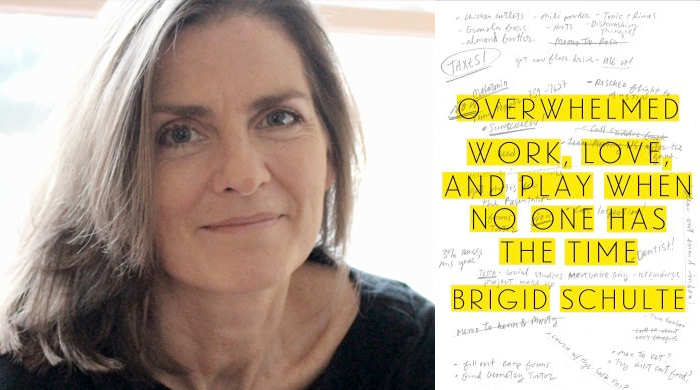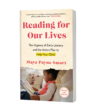Are you an elite competitor in the Busyness Games? Do you find new and creative ways to divide your time and attention? If so, then “Overwhelmed” is a must-read. It methodically reveals the tangle of unrealistic personal expectations, social pressure, and workplace inflexibility that conspire to push modern American schedules to the brink.
The book documents how, toward the end of the 20th century, busyness took on a kind of alluring high social status, distinct from previous eras. “What changed is the cultural imperative not just to have it all, but to fit it all in on the fast track, packing in a multitude of work, activities, and obligations until life feels, as one researcher put it, like an exhausting ‘everydayathon,’” Schulte writes.
It also illuminates one additional barrier to down time for women–the complete and utter lack of historical precedent for it. “Understand that, for women, there never has been a history or culture of leisure or play, unless you consider sweeping, making cheese, churning butter, quilting, and knitting your kind of fun,” she writes.
And these aren’t just the superficial observations of a harried author-mom. They are the considered conclusions of Schulte’s journalistic enterprise–the synthesis of countless in-depth interviews with time-use researchers, sociologists, neuroscientists, futurists, social psychologists, labor economists, legal scholars and more. Schulte gets kudos for living a scattered, frenzied, exhausting life and making the time to research an antidote to crazy-busy–for us and herself.
One of her findings is that we feel more time-starved than we actually are. We exaggerate how much we work–and how much we need to work to do well. We fail to recognize the leisure opportunities we have, allocating the time to less fulfilling (and sustainable) activity instead. We’ve fractured, fragmented and contaminated our time beyond reason–and at great personal and societal cost. And we’ve done so because of fundamental misunderstandings about leisure and its value for everything from personal life quality to national defense. (Yes, it’s that serious.)
I’ve made a couple of specific behavioral changes as a direct result of reading this book:
Time Tracking: I was intrigued by the work of the many time-use researchers that Schulte cites and began maintaining my own time diary to gain insight into how I spend my days. I use Toggl, time tracking software available online or via mobile app, and simply type what I’m doing, what project it’s associated with, and hit a start button. Later, I hit stop when I’m done and voila–a record of how my time was spent. After timing several tasks over several days, I’ve now got a bunch of data that I can analyze to get a feel for how efficiently–or not–I’m using my time.
Thoughtful Unitasking: Toggl’s simple interface asks, “What are you doing?” As a result, I’ve gotten into the habit of pausing frequently to ponder that question: “What are you doing, Maya?” This helps me hone in on what I really want to accomplish in a particular time frame.
For example, I used to beat myself up about spending too much time in my email inbox. But by asking myself, what are you doing?, I realized I’m not whiling away the days in useless conversation with whoever happens to write me, as I suspected before. Often, I’m doing important work in my inbox, and it’s affirming to pause and consider exactly what that work is. I might be reading messages that directly relate to my core projects. I could be drafting responses that drive the agendas for upcoming meetings in thoughtful directions. I may be connecting great people to one another.
So rather than having a vague sense that I spend too much time on email, I now look at the substance of my activity in the moment and discern when I’m wasting time (needless communication) and when I’m doing my thing (advancing causes and projects I care about). More often than not, I’m doing my thing and it gives me a little energy boost to acknowledge it.
After reading “Overwhelmed,” considering its arguments and applying some of its lessons, I have great clarity about where I spend my time and why. Moreover, I have a new awareness of my power to choose differently and an urgency about doing so. The role overload and task density that plague so many of us felt very optional after reading the book. It bolstered my resolve to relentlessly decline unwanted projects, activities and invitations so I can focus on the vital few. I hope it can do the same for you. Life’s too short to waste being busy when you could be effective instead.


